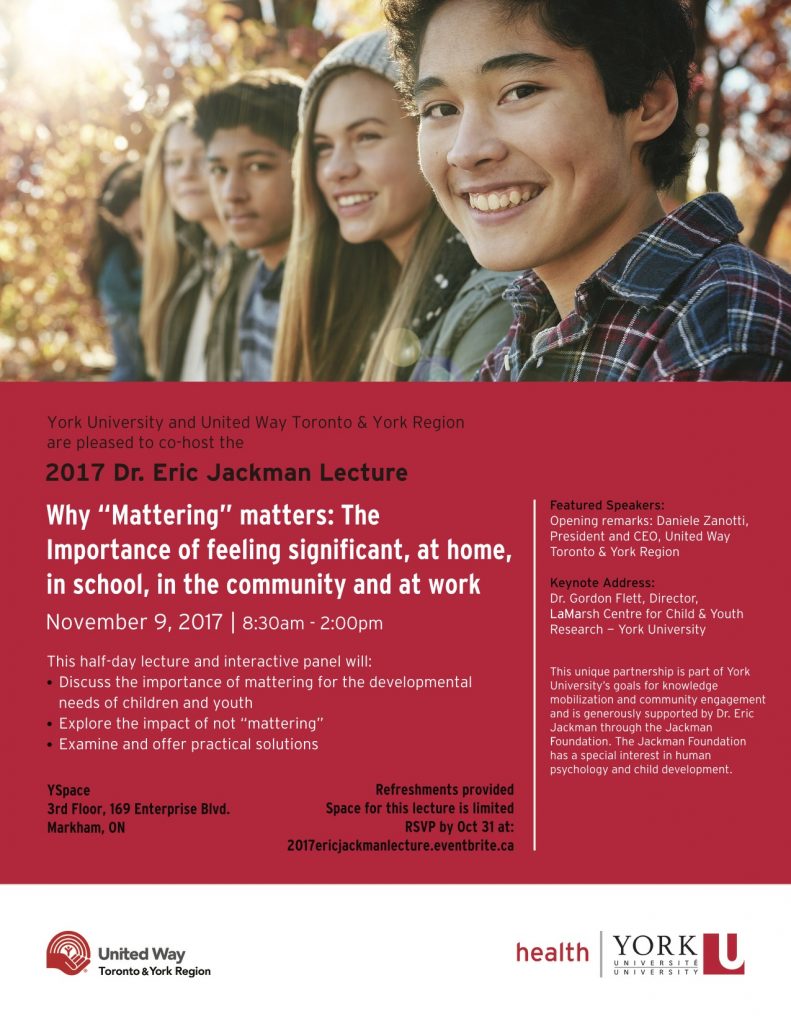TORONTO, Wednesday, November 8, 2017-There is growing evidence that many young people are still flying under the radar when it comes to mental health problems, especially in children and adolescents. There is also concern of an apparent epidemic of among this group of soaring rates of anxiety and depression being detected. Feelings of not mattering are far too prevalent among adolescents in terms of costs and consequences.
In partnership with the United Way Toronto, and York Region, York University professor Gordon Flett will speak at “Why ‘Mattering’ Matters: The Importance of Feeling Significant at Home, School, in the Community and at Work.” Professor Flett is the Director of the LaMarsh Centre for Child and Youth Research and holds a Canada Research Chair in Personality and Health. He will deliver York University’s annual Dr. Eric Jackman Lecture.
Date: Thursday, November 9, 2017
Time: 8:30am to 2:00 pm
Location: YSpace, 169 Enterprise Blvd, 3rd Floor, Markham

This lecture will be followed by panel discussions with mental health leaders and community partners with the shared goal of addressing the need for young people to feel like they matter. Professor Flett will share new evidence that shows 3 in 10 adolescents do not feel like they matter and about 1 in 2 adolescents do not feel like they matter in their community. He discuss the link between the feelings of not mattering with the current soaring rates of anxiety and depression being found among young people.
As the keynote speaker, Professor Flett will address:
- How mattering has incredible potential from a knowledge mobilization and program implementation perspective. Existing initiatives such as the “We Matter” campaign in Canada, which offers support to Indigenous youth
- The need for organizations, communities, etc., to proactively create opportunities for youth to develop a sense of mattering (e.g., mentoring and leadership roles, performing community functions that develop the sense that others are depending on them)
- How levels of mattering can vary dramatically across the domains of someone's life; mattering can be assessed in terms of their overall sense of mattering, but also in terms of mattering in their family, at school or at work and in the community
- The consequences of not mattering at the interpersonal relationship level as well the societal level, and the impact of feeling ‘disconnected.’
- How and why workers need to feel like they matter -- not mattering is linked with job dissatisfaction, turnover, and burnout
- The steps that can be taken by parents, educators, and community members
Media: For interviews or to attend, please contact Anjum Nayyar, York University Media Relations, 416 736 2100 ext. 44543 anayyar@yorku.ca
York University is known for championing new ways of thinking that drive teaching and research excellence. Our students receive the education they need to create big ideas that make an impact on the world. Meaningful and sometimes unexpected careers result from cross-discipline programming, innovative course design and diverse experiential learning opportunities. York students and graduates push limits, achieve goals and find solutions to the world’s most pressing social challenges, empowered by a strong community that opens minds. York U is an internationally recognized research university – our 11 faculties and 26 research centres have partnerships with 200+ leading universities worldwide. Located in Toronto, York is the third largest university in Canada, with a strong community of 53,000 students, 7,000 faculty and administrative staff, and more than 295,000 alumni. York U's fully bilingual Glendon campus is home to Southern Ontario's Centre of Excellence for French Language and Bilingual Postsecondary Education.

